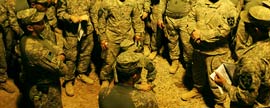Absolutely notify the chain of command – IMMEDIATELY. If the Soldier lives on post then the gun is required to be registered on post and the command can utilize the PMO to have it secured in the Arms Room for the Soldier’s safety.
If the Soldier lives off post then it is a bit more difficult. However, the Soldier’s spouse could voluntarily turn over the weapon to the unit. To forcibly remove it from off post quarters the unit would have to coordinate with the local authorities and get a court order.
The first course of action would be to ask the Soldier to voluntarily turn over the weapon to have it secured in the Arms Room. The medical personnel should have had the Soldier evaluated by a Behavioral Health Provider when the Soldier first reported they were down and depressed.
The very last thing this unit wants is to know the Soldier is down and depressed, do nothing, and the Soldier attempt to hurt himself.
Bottom line, the unit should take action to ensure the Soldier’s safety and health. Nothing should be done without coordination of the unit’s servicing legal office. There is always an attorney on call.
We Appreciate your feedback! Did you find this information Useful?















Comments
SGT NICK
Unless the soldier is admitted to impatient care, someone saying they are depressed is not grounds for this type of action. This is leadership attempting to correct something the mental health professional or psychiatrists are qualified to deal with. That information is private under patient doctor confidentiality until the soldier admits that they are going to hurt someone else or themselves. Your not doing anything good by getting too many people involved in in the soldiers life that will lead to many judgements that could impact their career.
Mark Gerecht
Nick,
Have to disagree! Once a leader is provided information that Soldier is depressed, owns an weapon and the potential to cause harm is there…the Command has a duty, responsibility, and obligation to act. How they act requires the chain of command to use common sense and the relevant information they have concerning the issue. There is nothing in this post that says medical authority improperly gave out information. For all we know the Soldier shared this information with the leader. In this case it could be a cry for help from the Soldier. Maybe the Soldier told a buddy. If this Soldier was to attempt an act of hurting themselves or others and the chain of command did nothing thats the wrong side of this argument to be on.
Let’s forget who is to blame Let’s look at what happens if things go right. It is far more important to take action that prevents a potential death or harm to a Soldier or other person.
TOP